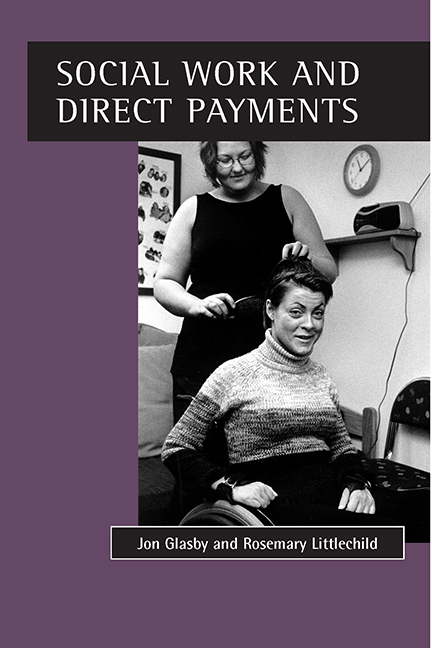Book contents
- Frontmatter
- Contents
- List of tables and boxes
- Foreword
- Acknowledgements
- List of abbreviations
- one Introduction
- two History
- three From indirect to direct payments I: legislation
- four From indirect to direct payments II: guidance and extension
- five The progress of direct payments
- six The experiences of different user groups
- seven The advantages of direct payments
- eight Possible difficulties
- nine Practical issues
- ten Conclusion: implications for community care
- Bibliography
- Appendix Useful resources
- Index
- Related reports from The Policy Press
four - From indirect to direct payments II: guidance and extension
Published online by Cambridge University Press: 05 April 2022
- Frontmatter
- Contents
- List of tables and boxes
- Foreword
- Acknowledgements
- List of abbreviations
- one Introduction
- two History
- three From indirect to direct payments I: legislation
- four From indirect to direct payments II: guidance and extension
- five The progress of direct payments
- six The experiences of different user groups
- seven The advantages of direct payments
- eight Possible difficulties
- nine Practical issues
- ten Conclusion: implications for community care
- Bibliography
- Appendix Useful resources
- Index
- Related reports from The Policy Press
Summary
This chapter examines the policy and practice guidance that accompanied theintroduction of direct payments and the subsequent extension of directpayments to new user groups. Under the 2001 Health and Social Care Act, theSecretary of State for Health can now issue regulations requiring localauthorities to make direct payments to an individual who fulfils therequirements of the scheme and agrees to be part of it (see page 46).
Policy and practice guidance
After the passage of the 1996 Community Care (Direct Payments) Act, officialpolicy and practice guidance was issued in May 1997 (DoH, 1997a; seeDepartment of Health, Social Services and Public Safety, 1997; NationalAssembly for Wales, 1997; Scottish Office, 1997 for further details ofdirect payments in Scotland, Wales and Northern Ireland). This guidance waslater revised and improved (see page 42 and DoH, 2000a).
Whereas the 1997 policy guidance set out what localauthorities should do if they chose to exercise their new power to makedirect payments, the practice guidance advised on howauthorities might implement the Act. From the very beginning, thepolicy guidance emphasised that the government'saim was to enhance the independence of service users by giving them controlover the way that community care services are delivered. To maximise thisindependence, local authorities should work in partnership with disabledpeople and leave as much choice as possible in the hands of the serviceuser, while at the same time ensuring that the individual's needs arebeing met and that public money is being used appropriately andcost-effectively. Although authorities now have the powerto make direct payments, they do not have a duty to do soand retain discretion over:
• whether or not to implement direct payments;
• for which services (if any) payments are available;
• whether to arrange some services for users as well as makingpayments;
• whether or not to offer someone a direct payment;
• how much flexibility individual recipients have over the waythe money is spent;
• how much of a payment to make and what it is supposed tocover.
Whatever the authority decides to do, it should not treat direct paymentrecipients any more, or less, favourably than people receiving services andshould continue to develop other ways of making services moreresponsive.
- Type
- Chapter
- Information
- Social Work and Direct Payments , pp. 33 - 48Publisher: Bristol University PressPrint publication year: 2002



